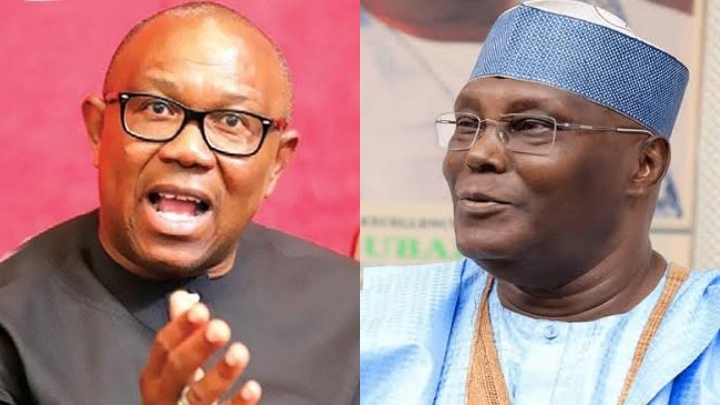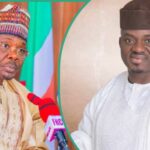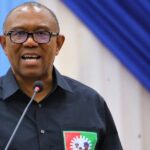Despite how passions and emotions might have ran and even continues to run on the outcome of the February 25 presidential elections, the mathematics and politics of why candidates Atiku Abubakar, Peter Obi and others are evidently palpable and even as judicial interventions is widely, expected, the law, no matter how dispassionate it is or would be, cannot insulate itself from the mathematics and the underlining political implications of the outcomes of the elections.
In simple mathematical terms, had candidates Atiku Abubakar and Peter Obi who ran on a single ticket of the Peoples Democratic Party in 2019 and polled 11,262,978 votes or 41.22 per cent not allowed ambitions to tear them apart, they would have easily won the 2023 presidential poll. Their separate votes of 6,984,520 and 6,101,533 on their political party platforms of the Peoples Democratic Party and Labour Party respectively, would have collectively yielded a total of 13,086,103; a handsome incontrovertible number that would have comfortably given them, an unquestionable electoral victory. The candidate of the ruling party who has been declared winner in the presidential poll with his total vote of 8,794,726 would have trailed behind.
Unable to stick together to confront a ruling party, whose fortunes were on a free fall for combinations of several reasons, candidates Atiku Abubakar and Peter Obi invited to themselves a well-known misfortune and traditional bogey of opposition parties, who almost all the time, fall, when divided.
By the 2019 election when they polled 11 million plus to the incumbent’s 15 million plus, the incumbent president was on the ballot, and the ruling party’s goodwill was still holding to about 50 per cent but in the run-up to the 2023 presidential election, the ruling party was flat on its belly in terms of popular goodwill. Ironically, the presidential candidate of the party and now president-elect has been pushed out from the mainstream of the party. Both in the primary nomination and general elections. Mr Bola Tinubu, some governors from the Northern States, about 12 of them, acquired a reputation as a credible opposition to both their own party and government.
APC adopts direct mode of primary for Kogi gov’ship poll
Supplementary polls: 36,935 voters to decide Fintiri, Binani’s Fate in Adamawa
Even Atiku and Obi at a point entertained some illusions that either of them could be adopted by the powerful clique, who in desperation, orchestrated the toxic and politically motivated vindictive measure of the naira design, ostensibly designed to make the ruling party candidate stumble and fall.
In the face of the massive dislocation of lives for many Nigerians, arising from the currency design, Obi and Atiku stayed ambivalent and probably hoping to profit from the goodwill of those that instigated the naira design mayhem, while only the ruling party and its candidates stood in firm opposition to the measure.
Plainly speaking, had candidates Atiku Abubakar and Peter Obi managed to hold together and hold in check, their respective ambitions that tore them apart, both the geo-political and ethno-religious sentiments prevailing in the country were overwhelming on their side.
The South East which has always been the traditional bastion of PDP, dramatically swung to the Labour Party. Peter Obi and his Labour Party dutifully harvested the widely shared sentiment in the region of “our turn.” Whatever became later of the hurricane of the Obidient movement was triggered by regional and ethnic sense of entitlement, which in itself, is not an aberration and it was in that regard that Mr Obi backed out of the PDP nomination, in conforming to the mainstream position in the South East, that the region will not play the second fiddle.
The Obedient movement, mostly powered by social media activism, promoted as pan-Nigerian secular movement attested to its origin and its limits, when the electoral chickens came home to roost after the elections. If our recent history is guide, the party and its candidate’s stridency is not entirely new. In 2011, the Congress for Progressive Change, (CPC) formed by the then, candidate Buhari, who had previously lost two elections and The Buhari Organization (TBO) triggered Nigeria’s most feverish political session. Despite not being powered by social media activism; the CPC was even a more formidable hurricane.
However, the CPC made many costly mistakes. In choosing the vice presidential candidate, candidate Buhari chose Mr. Tunde Bakare, a vocal cleric but with little or no political influence in South West. Without a credible political interlocutor in the South or more specifically, the South West the CPC failed to make any inroad to other parts of the country, except the North.
In a similar political diminutive vision, the Labour Party presidential candidate choose for a running mate, a vocal Northern entrepreneur, with little or no grassroots political appeal and who would as widely expected lose his polling unit. As Buhari, who had no credible political interlocutor to the South in 2011, Peter Obi’s electoral hurricane simply hit a brick wall going northwards and the little wind left in its sail, was conclusively blown away, by the time the gubernatorial and state assembly elections were held three weeks later. As its historical parallel partner, the CPC, the Labour Party took only one state, Abia.
After the CPC hurricane blew feverishly and faltered, leading to the grand “weeping” of candidate Buhari, he quickly realized that neither the cult following of his fanatical supporters nor his reputation as incorrigible and ascetic army general was enough to deliver an electoral victory on a national scale.
The Labour Party, its presidential candidate, Mr Peter Obi and their allied obedient movement should never ignore the instructions of the lessons in the rise, fall and transformation of the Congress for Progressive Change (CPC). It is either the labour plant themselves firmly in Kaura Namoda, Daura, DutsinMa and other northern communities or seek alliance with parties with credible engagements in these areas or forever perish in the illusions that zealous followings with a considerable dose of political rudeness will translate to electoral success.
For the Peoples Democratic Party, it let pass its finest political and electoral hour. It only sacked its former controversial national chairman, Mr Iyorchia Ayu, after it lost the election, when it would have fought the election as a united party, had it accepted the demands of its dissident five governors, who not only distracted the party but also undermined it, from within.
The camp of the president-elect has openly admitted that, had the splinter candidates of Atiku Abubakar, Peter Obi and Rabiu Musa Kwankwaso fought on the same platform as they did, four years earlier in 2019; winning for the ruling party and its excessively persecuted candidate would have been an uphill task, if not, an outright impossibility.
Except for the purpose, to keep the electoral democracy noisy and to maintain the adversarial posture of opposition parties as the alleged substance of liberal democracy, it is not really far-fetched why and how the 2023 presidential election was won and lost.
Onunaiju, research Director, Abuja-based Think tank.

 Join Daily Trust WhatsApp Community For Quick Access To News and Happenings Around You.
Join Daily Trust WhatsApp Community For Quick Access To News and Happenings Around You.

